Even the driver seemed surprised! Bad sign, these guys have seen it all. In the center of the brightly painted wheel, where the hub should have attached to the axle, was a jagged gaping hole. We'd already used our spare wheel and our jack wasn't working anyway, so we did what anyone in West Africa would do in this situation: we settled in to wait for help.
The merciless sun bullied most passengers into the shade of a nearby tree. They sat nonchalantly, as if this happens every day, chatting idly or just watching the empty road. A man pulled a few dead chickens from the wooden cage on the roof, hauling them grotesquely through narrow holes by their legs and tossing them into the bushes. I squatted nearby in some different bushes, dealing with what I guessed was Giardia and thinking that the ride was going very badly indeed.
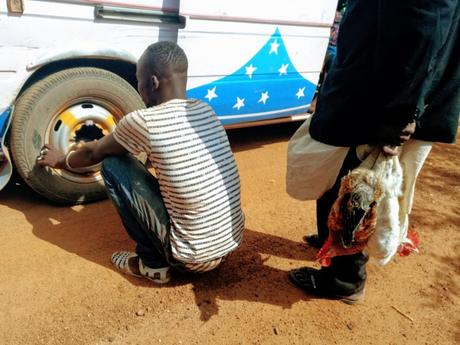
We were trying to travel from Kong to Bouake in the country of Côte d'Ivoire, or Ivory Coast to an anglophone like me, out of my element linguistically and otherwise this francophone nation. The journey was only 250 kilometers, but it was beginning to look like an all-day project. After traveling overland through four other West African countries more uniformly lacking in infrastructure, the contrast in Côte d'Ivoire was disorienting.
A few days prior I had occupied a full reclining seat, actually a whole row, in a clean air-conditioned bus zipping along a smooth paved highway. Two days later I would visit the administrative capital of Yamoussoukro and its bizarrely ostentatious Basilica of Our Lady of Peace, the biggest church in the world. Let that sink in: the biggest church in the world. The cathedrals of Europe, St. Peter's Basilica in the Vatican, all outdone by a cavernous political display of wealth in a past-prime West African capital. But here I was, just a few hundred kilometers north of all that gold and marble, waiting for help beside a red dirt road.
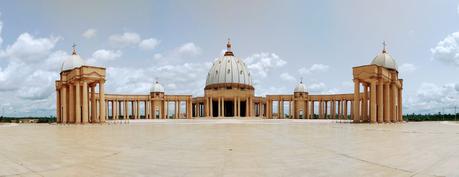
Finally another van rattled to a stop. We used their jack to install their spare, which was bald and half flat, but at least it attached to the axle. This was the third encounter in an exchange begun hours earlier when this same van had offered their jack to help us fix a flat tire. We repaid the favor an hour later when we found them stopped with engine trouble. Now they were one point ahead again in the survival strategy of good Samaritanism. Pay it forward, pay it back, join the collective network that gets everyone through their days in this tough place where all the essential objects work only half the time.
With the new wheel installed we piled optimistically back into our eccentric van. The brilliant American eagle painted across the hood belied the grim conditions inside: my row of five seats contained eight humans. To my left a family of four occupied one and a half of them.
Mom and baby had fallen asleep while breastfeeding and mom's head flopped onto my shoulder. When she woke like this she saw no need to apologize, giving me the pleasant feeling that I was welcome to fall asleep with head on her shoulder if I wanted to. Dad rested his head against the seat in front while a little girl with green beads in her hair slept curled in his lap. I marveled at their collective ease, the way their family unit seemed to have carved out a peaceful cocoon from the sweltering, rattling space.
From the row behind, chicken feathers gently caressed my lower back through the gap in the fold-up seat. It was a humid 90+ degrees Fahrenheit, and the old man with two live chickens in his lap was wearing a black suit jacket. What important business was he traveling for? Attending a wedding perhaps, or a graduation party? Both would be occasion for a suit and a gift of chickens, a high-value asset in this part of the world. Beside his formal finery I felt shabby in my sweat-stained travel clothes.
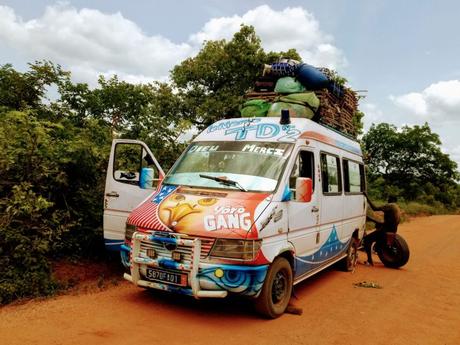
Back on the road hours passed in a cramped communal daze, punctuated by the driver yanking his door shut every time it jolted open. We made a couple stops to fiddle with the new wheel. Eventually the equatorial sun hovered near the horizon. I was about to break Non-Negotiable West Africa Travel Rule #1: get the heck off the roads by dark.
This rule is not due to bandits or roving militias, at least not in this region, and not anymore. No, it's because of vehicles like ours, often lacking accessories like lights and mirrors, driven down unlit potholed roads by drivers with unflinching faith in their god and little expectation of enjoying a peaceful old age.
Our driver stuck fastidiously and inexplicably to the left lane. This would have been great in neighboring Ghana, where I suspect he learned his craft, but in Côte d'Ivoire traffic moves on the right. Oncoming trucks flashed their lights, if they had any, and we swerved right to let them pass in their lane before returning left. Traffic increased as we approached the main highway in our limping shell of a vehicle. Not wanting to be ruled by fear, I tried to make a rational assessment of risk. It didn't look promising.
In the town of Katiola I bailed from the ride. Only an hour from my destination - if no more wheels fell off the van - it seemed like an overreaction. But it felt right. I had taken enough chances in West Africa already. The driver grudgingly clambered onto the roof to unload my backpack. The other passengers were perplexed, and my survival-level French was insufficient to explain. How do you tell someone their daily life is beyond your acceptable risk threshold? Our opposite worlds collided with shrugs and smiles in quiet, awkward confusion.
I walked two blocks in the dark, found a comfortable enough hotel, and fell asleep pondering the vast range of human experience on this crazy planet. The cursed van, I later found out, made it to Bouake in one piece, spared to menace the roads of Côte d'Ivoire another day. And I soon returned home to America, an orderly land of manicured lawns and vast asphalt parking lots, to find that everything looked a little different than before.
Yes, things work better in America. What traveler hasn't reveled in that first hot shower when returning to an infrastructure-rich home after months without? But the differences ran so much deeper.
In West Africa I had seen life lived vibrantly in the open on sun-baked streets. Strangers there make eye contact like it's a normal thing to do. Adaptability and ingenuity are basic survival skills. Ramshackle structures and vehicles are valued for their function, while people decorate themselves with colorful cloth. In the evenings they return home to a tangled network of children, siblings, cousins, and respected elders all under the same roof and in the same front yard. The circle of life is inescapable: too many people die too young. If you want to eat a chicken for dinner, you kill it. There is no use chasing eternal youth or pretending life is anything but a fragile miracle.
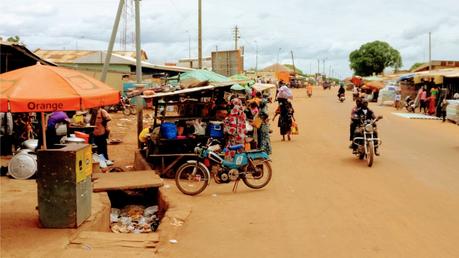
My suburban California neighborhood, by comparison, is optimized for a different set of priorities. The grid of neat single-family homes hides the life happening inside, a single nuclear family ensconced within each despite pleasant weather and elaborate landscaping. A few people wearing neutral-colored clothes walk a single baby or lovingly groomed dog on smooth sidewalks, each in their own world. Every morning freeways fill with clean cars, windows up, thousands of solitary souls gridlocked next to each other on a river of pavement. We are saving for retirement, planning for the future, keeping busy, building our sense of stability and permanence. With all our basic needs met, we reach for a more abstract level.
In Africa many people told me they wished for their home to become just like America. They were surely thinking of the material wealth, the perceived ease of upward mobility, the American Dream. I join them in wishing for an end to their poverty. I also long for their society to borrow from mine in ways most of them wouldn't currently agree with, like the trend toward equal social status for women. But becoming exactly like America? I see now that it's a complex tradeoff.
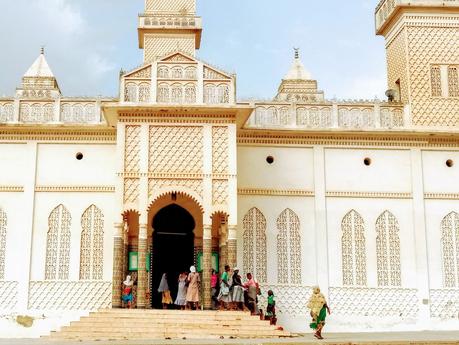
I told all these people the same thing: If we could take the best parts of America, and the best parts of Côte d'Ivoire or Liberia or Sierra Leone, and merge them together, we would have paradise. Of course both regions host a range of lifestyles, perspectives, and levels of economic prosperity, but there's no denying they center around opposite ends of some important spectrums. Is it even possible to blend the communal, adaptable, live-for-today spirit of one of the world's poorest regions with the material abundance, health and safety, and personal ambition of one of the world's richest? If the economic gap were miraculously closed tomorrow, which differences would fade and which would remain?
I don't know, but I welcome the questions and the confusion they stir. This is the magic of travel. Somewhere during those long days of intense overland journeys and spontaneous interactions, West Africa inspired me in unexpected ways. It didn't steal my heart exactly - it was too difficult for that - but it stole my cultural blind spots. The version of me who thought the world was simpler is still over there somewhere, probably squatting in the bushes by the side of a red dirt road, waiting for help to come along and fix a broken wheel. I left her there, and she's never coming back.

